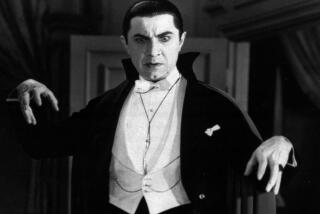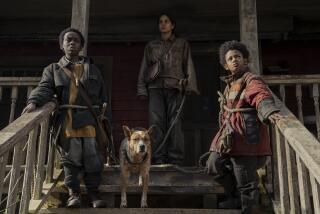JACKET COPY
- Share via
In any 1970s horror movie worth its splatter budget, there’s a crucial moment when a comely young woman examines herself in a mirror and is promptly killed. For Trinie Dalton, such hopelessly cliched moments are packed with clues to our darkest fears.
Dalton is the editor of “Mythtym,” a new anthology of essays, fiction and artwork -- both serious and campy -- about werewolves, unicorns and what she calls “mirror horror.” As she explains: “If you watch enough of those movies, they’re all exactly the same. These splatter-core movies have their own tropes -- like how the best way to show blood is to cut someone up in the shower so you see it on the tiles. But then you realize that these cliches are based on archetypes. The mirror as a symbol seems most powerful in a time of fear, when people step back and look at themselves.”
“Mythtym” is a deep investigation into, and a cheeky balm for, the things that scare us. It’s composed of three different zines that Dalton, author of “Wide Eyed” and a compiler of “Dear New Girl or Whatever Your Name Is,” made over recent years.
In “Mirror Horror,” the anthology’s first and largest section, she traces the theme of damning narcissism in works as diverse as the woodcuts of Albrecht Durer and the blood-bucket slasher flicks of Dario Argento.
Then, echoing the wry spirit of her friend, performance artist Miranda July, she follows up with a section devoted entirely to unicorn kitsch.
Unicorns -- really?
Instead of derailing the book’s otherwise involved explorations of mythology and high-gloss production values, this offers a knowing wink at the silliness of such pursuits.
“That’s just my sense of humor, and it’s a very contemporary way of making art, to just throw everything in there,” Dalton says. “It’s like how I watch horror movies that might otherwise be disturbing: If you look at it with an intellectual framework, or people around you are laughing at the scenes, you’re not scared of it.”
“Werewolf Express,” the book’s final segment, splits the difference, bookended by Dalton’s essay on werewolf mythology and feminist semiotics and an illustrated spread of dog stickers offering advice to Shelley Duvall. In between is a smattering of short work by authors such as Rachel Kushner and Amy Gerstler, as well as photos of mixed-media sculpture, campy illustrations and video stills.
“Mythtym” may be the ideal reference book for our collective psyche -- at once macabre, escapist and unexpectedly incisive. It might even take us back to a time when we were afraid to drift too far from the campfire.
“Maybe it’ll return us to a healthy respect of nature,” Dalton says. “I love hiking by myself. I’ll go out on a trail for miles and never once feel scared. This is an artificial condition. I’m glad I get to be out there, but maybe people wouldn’t thrash nature so much if we were more afraid of it.”
--
More to Read
Sign up for our Book Club newsletter
Get the latest news, events and more from the Los Angeles Times Book Club, and help us get L.A. reading and talking.
You may occasionally receive promotional content from the Los Angeles Times.










